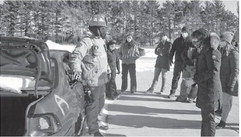CVTC class allows RNs to work as first responders


Cheryl Bergmann, a registered nurse who lives in Pepin, knows there is a great need for help at the local ambulance service. As a medical professional herself, she wanted to help, ...


Cheryl Bergmann, a registered nurse who lives in Pepin, knows there is a great need for help at the local ambulance service. As a medical professional herself, she wanted to help, ...